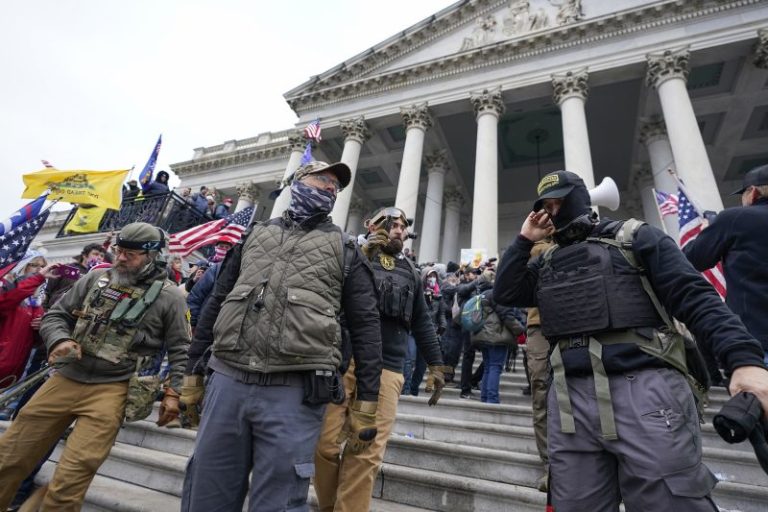Wrapping up closing arguments Monday, lawyers for three of five Oath Keepers associates facing trial for seditious conspiracy in the Jan. 6, 2021, Capitol riot accused federal prosecutors of manipulating evidence by omitting key messages and overstating their involvement in the attack.
Prosecutors countered by urging jurors to convict Oath Keepers founder Stewart Rhodes and four co-defendants, citing “overwhelming” evidence “right in front of your eyes.”
“Make no mistake, he [Rhodes] wanted to start a civil war,” Assistant U.S. Attorney Jeffrey S. Nestler said. “They wanted to attack what they saw as an illegitimate government. Their own statements prove the government’s case.”
U.S. District Judge Amit P. Mehta submitted the case to the jury after eight weeks of trial, 46 witnesses and hundreds of exhibits. The jury is set to begin deliberations at 9:30 a.m. Tuesday, take off the rest of Thanksgiving week if no verdict is reached, and resume deliberations next week.
Defense attorney Bradford Geyer cast client Kenneth Harrelson as a follower, not a leader on Jan. 6. The jury did not see Harrelson’s communications — not because he deleted them, as prosecutors alleged, but because he didn’t participate in planning, Geyer argued.
“This is no longer about scary words,” Geyer said, “which is bad enough. Now you’re asked to convict based on what he might have been thinking.”
He said Harrelson was apolitical, only agreed to travel to D.C. on Jan. 4, 2021, and never had any intention of entering the Capitol, though he did so as part of a stack of Oath Keepers on the east side of the building.
What to know about the Oath Keepers sedition trial
1/2
End of carousel
Geyer and Jonathan Crisp, the attorney for defendant Jessica Watkins, criticized how prosecutors presented videos and evidence, calling it “government manipulation or deception.” He noted that prosecutors showed group chat discussions on the Signal app, used by Rhodes and many other members before and during Jan. 6, but omitted certain posts and wrongly implied Watkins responded to messages she did not answer.
Watkins admitted on the stand that she went into the Capitol, and apologized for it.
Crisp noted that prosecutors never asked Watkins, during her testimony, if there was “a plan to stop the certification. A plan to overthrow the government. … She was never asked about that.”
He said prosecutors “will put anything in front of you, to lie and twist it. If they will go to this extreme for their narrative, for their context, they are entitled to no credibility.”
Crisp and David Fischer, attorney for Virginia resident Thomas Caldwell, both said their clients believed that by 2:20 p.m. on Jan. 6, when members of Congress were evacuated, that the confirmation had been completed. Therefore, Watkins and Caldwell had no intention of disrupting the electoral college count.
“Can you stop something that’s already stopped?” Crisp asked. “How do you kill a dead body?” But the electoral college count had only been postponed, and was restarted about six hours later.
Nestler responded that Congress wasn’t dead. He argued that Watkins and Caldwell were communicating with people outside the city and knew the count hadn’t been completed.
Fischer noted that Caldwell had no communication with Rhodes after mid-November. Fischer also said the government initially accused Caldwell of being an Oath Keepers leader who went into the Capitol, allegations that prosecutors later rescinded. Caldwell wasn’t found on any of the Oath Keepers’ Signal chats or phone meetings, and only communicated with a North Carolina Oath Keepers group that had split off from Rhodes, Fischer said.
Caldwell is accused of coordinating a “Quick Reaction Force” with an arsenal of guns based at an Arlington hotel, but “why would the Oath Keepers have a non-Oath Keeper coordinate the QRF?” Fischer asked. “Mr. Caldwell had no contact with Stewart Rhodes. He had no contact with Oath Keepers on Jan. 6. None. He’s the coordinator of the QRF? How’s that work?”

